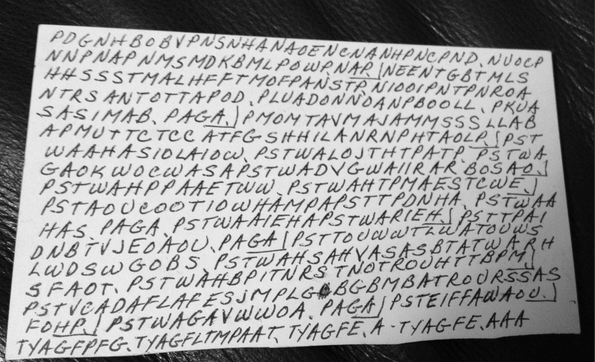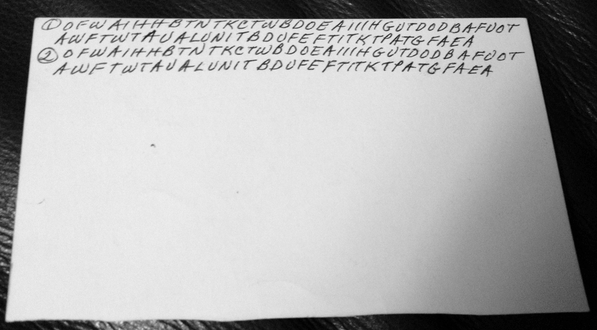Heart-warming tale of crowd-sourced decipherment
« previous post | next post »
"Decoding cancer-addled ramblings", Ask MetaFilter 1/20/2014:
In my grandmother's final days battling brain cancer, she became unable to speak and she filled dozens of index cards with random letters of the alphabet. I'm beginning to think that they are the first letters in the words of song lyrics, and would love to know what song this was. This is a crazy long shot, but I've seen Mefites pull off some pretty impressive code-breaking before!
My grandmother passed away in 1994 of a fast-spreading cancer. She was non-communicative her last two weeks, but in that time, she left at least 20 index cards with scribbled letters on them. My cousins and I were between 8-10 years old at the time, and believed she was leaving us a code. We puzzled over them for a few months trying substitution ciphers, and didn't get anywhere.
My father found one of the cards the other day and I love puzzles and want to tackle the mystery again. Based on some of the repeating segments (many lines start with PST, many end with PAGA, and TYAGF repeats often at the end), I'm thinking they may be song lyrics. She inserts lots of backwards commas, and strange breaks at various points that could indicate stanzas. The back of the card has two numbered lines that contain the same letters. The letters (with line breaks to match the card) and images of the cards are below.
Within 14 minutes, harperpitt had figured out the first couple of lines of the back of the card:
OFWAIHHBTNTKCTWBDOEAIIIHFUTDODBAFUOT
AWFTWTAUALUNITBDUFEFTITKTPATGFAEA
Our Father who art in Heaven, hallowed be thy name… etc etc etc
Others jumped in as well, and decoding continues.
For some additional discussion, see Alex Goldman, "Yesterday, the internet solved a 20-year-old mystery", 1/21/2014.


AntC said,
January 21, 2014 @ 3:59 pm
So the poor woman was not rambling, but holding desperately to her faith and her family in her hour of need. And the family did not understand. This is heart-rending.
My own mother, dying of cancer a few years ago, became impossible for us to understand as her brain succumbed.
To try to rescue a linguistic point: the grandmother seemed able to write clearly, and (perhaps with her interior voice) able to recite familiar verses. Is this a recognised form of decay of language function? (I remember Dr Johnson's description of his own recovery from a stroke by reciting Latin verses.)
Lane said,
January 22, 2014 @ 12:41 am
I heard another story of memorized language being one of the few things left in a dying man. An old girlfriend's great grandfather seemed to be babbling in the hospital, when someone realized it was Japanese. He had been a missionary as a young man, and was (the story goes) recalling prayers and memorized sermons. I always wondered if that was plausible.
rwmg said,
January 22, 2014 @ 2:26 am
Dr. Johnson's Latin prayer was not memorised but impromptu as a test of whether the stroke had affected his mind.
From the Gutenberg edition of Boswell's "Life of Dr. Johnson"
'On Monday, the 16th, I sat for my picture, and walked a considerable way with little inconvenience. In the afternoon and evening I felt myself light and easy, and began to plan schemes of life. Thus I went to bed, and in a short time waked and sat up, as has been long my custom, when I felt a confusion and indistinctness in my head, which lasted, I suppose, about half a minute. I was alarmed, and prayed God, that however he might afflict my body, he would spare my understanding. This prayer, that I might try the integrity of my faculties, I made in Latin verse. The lines were not very good, but I knew them not to be very good: I made them easily, and concluded myself to be unimpaired in my faculties.
http://www.gutenberg.org/files/10357/10357-h/10357-h.htm
AntC said,
January 22, 2014 @ 4:13 am
Thank you rwmg for the "crowd-sourced" correction.
And my O.P. was not meaning to quosh myl's "heart-warming" — I hope the family has gotten some comfort. Could the internet have achieved so much (so quickly) 20 years ago?
Xmun said,
January 22, 2014 @ 2:03 pm
A more conventional reference to the passage quoted by rwmg is that it comes from a letter written to Mrs. Thrale on June 19th, 1783, i.e. at the age of 74, and is quoted by Boswell from "Vol. II, p. 268, of Mrs. Thrale's Collection".
Glenn Bingham said,
January 25, 2014 @ 5:02 am
Independent of the Lord's Prayer discovery, I came up with this repeating phrase possibility: PSTWA ~ Prayers say that we are (happy/willing/etc.)…
Just a shot in the dark.
Glenn Bingham said,
January 25, 2014 @ 5:04 am
PAGA ~ Praise almighty God. Amen. ???
Participatory Culture, Participatory Editing, and the Emergent Archival Hybrid - Archive Journal Issue 4 said,
April 29, 2014 @ 2:44 pm
[…] [29] See “Decoding cancer-addled ramblings,” Ask Metafilter, January 20, 2014, http://ask.metafilter.com/255675/Decoding-cancer-addled-ramblings, and Mark Liberman, “Heartwarming tale of crowd-sourced decipherment,” Language Log, January 21, 2014, http://languagelog.ldc.upenn.edu/nll/?p=9902. […]